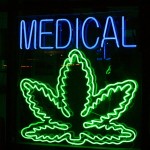Medical Marijuana: What Physicians Think About It?
 Medical Marijuana: A Growing Trend
Medical Marijuana: A Growing Trend
The legalization of marijuana for medical use is sweeping the nation. It is currently legal in 21 states and the District of Columbia; legislatures in 14 additional states are considering bills to legalize it for medical use in 2014. However, The Drug Enforcement Agency still lists marijuana as a Schedule I substance, or having “no accepted medicinal use and a high potential for abuse,” alongside some of the most dangerous drugs. The designation carries with it serious restrictions for research.
Current State of the Evidence
Schedule I designation makes research examining safety and efficacy of marijuana for a range of diseases difficult but not impossible. Originally promoted for the management of chronic and neuropathic pain, there are varying amounts of evidence for efficacy in epilepsy,multiple sclerosis–associated spasticity, and inflammatory bowel disease. In contrast, current data do not support use in glaucoma or rheumatologic conditions such as arthritis.
What Do Physicians Think?
In early 2014, Medscape and WebMD conducted a survey to solicit opinions of both physicians and consumers about the medical use of marijuana. A total of 1544 physicians participated, representing 12 specialties and 48 states. The survey also included 2960 consumers. The Medscape survey ran between February 25 and March 3, 2014, and has a margin of error of ± 2.5%. Approximately one quarter of participants (24.7%) identified as primary care physicians.
How Do Physicians View the Evidence?
A sizeable majority of physicians participating in the Medscape survey see marijuana as delivering real treatment benefits. Only 15% answered this question with a definitive “no” and 17% said they were just not sure. Essentially half (49%) said the benefits of medical marijuana outweigh the risks. However, there is another sizeable contingent that expressed concern about the risk/benefit ratio, with a combined majority saying the side effects can be mild (38%) or moderate (40%). Opinions expressed are not the result of personal use; less than 1% of physicians in our survey indicated that they had ever personally used marijuana for a medical reason.
Physician Opinion: Legal vs Nonlegal Marijuana States
The majority of physicians (68%) in our survey believe that marijuana should be a medical option for patients. Of note, though, smaller percentages indicated that it should be legal, a percentage that did not vary between physicians residing in legal vs nonlegal states. Half of all physicians in the survey (48%) say their patients have asked about the benefits of medical marijuana in the past 12 months. This conversation was 12% more likely to take place in states where medical marijuana has been legalized (60%). In states considering legalization, only 38% of respondents indicated that their patients had asked.
Does Physician Opinion Vary by Specialty?
Support for medical marijuana also varied by specialty. Oncologists showed the highest level, with 82% saying marijuana delivers real benefits to patients and 69% supporting legalization nationwide. Oncologists also had the second highest level of patient inquiries, at 66%, not surprising given the role of this agent in pain control and cancer-associated cachexia. Rheumatologists ranked the lowest in support for use, with 54% saying it delivers benefits and 44% supporting legalization. It’s not surprising, given recent trials examining use of marijuana in epilepsy and MS, that neurologists reported the highest number of patients asking whether medical marijuana might help them, at 70%.
Physician Opinion vs Public Opinion
Perhaps surprising, more physicians (69%) than non-MD WebMD readers (52%) believe that marijuana can provide real benefits for patients with certain conditions or receiving certain treatments, such as chemotherapy. The minority of both MDs and non-MDs surveyed feel that it has no benefits (15% vs 11%), while 37% of non-MDs are “not sure” about the usefulness of medicinal marijuana, vs only 17% of physicians.
Availability
MDs and non-MDs differed considerably in their views on where and how medicinal marijuana should be available: 53% of physicians vs 36% of non-MDs feel that it should only be available at pharmacies with a valid prescription. Just 19% of physicians vs 41% of non-MDs believe that patients should have access via both pharmacies and licensed retailers (with a physician’s written authorization).
